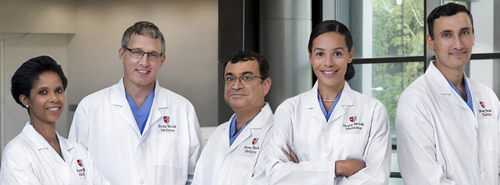Patients Should Research Their Cardiac Surgeon-Hospital Decision

| Our cardiac surgeons: (left to right) Drs. Allison J. McLarty, Thomas V. Bilfinger, Vinay M. Tak, Joanna Chikwe, and Henry J. Tannous. |
Thousands of heart surgeries are performed every day in the United States. Changes in heart surgery have truly been transformative, resulting in better quality of life, better outcomes, and more people being eligible for minimally invasive approaches. The key to getting optimal results starts with choosing the right surgeon.
One of the best ways to choose a cardiac surgeon is for patients to ask their cardiologist or general practitioner who he or she thinks would be the right surgeon for the particular procedure they need to have. The cardiac surgeon they trust most to take the best care of their patient is useful information.
"The cardiologists on Long Island know all the cardiac surgeons individually. They know what each surgeon does best, what their success rates are, and how good their teams are," says Joanna Chikwe, MD, chief of our Cardiothoracic Surgery Division and director of the Stony Brook University Heart Institute.
"And these cardiologists come to visit their patients after surgery, so they really get to know the doctors, nursing staff, and hospitals."
Once a patient has a few recommendations, it's okay to "interview" each surgeon to ask:
- How much experience does the surgeon have in treating their specific condition?
- How many procedures has the surgeon performed to treat the condition?
- What is the surgeon's success rate for the procedure?
It's important to note that information on the internet may be out of date, so patients should confirm what they find on it with their doctors.
Stony Brook Heart Institute is a leading center for cardiovascular medicine and advanced treatment options. Established in 1982, the Heart Institute successfully treats cardiac conditions ranging from heart attacks, arrhythmias, and valve disease to long-term heart failure.
Its team of cardiac specialists is dedicated to prevention and management of heart disease, providing exceptional care in state-of-the-art hospital facilities, as well as in the community and the homes of patients. The Heart Institute brings expertise to Long Island so that patients no longer have to travel outside the area to obtain the best care available.
The Heart Institute team has successfully performed thousands of coronary artery bypass operations, complex and reoperative cardiac surgery procedures, and has treated over 100 patients with advanced heart failure with ventricular assist (artificial heart) devices.
Getting optimal results from heart surgery starts with choosing the right surgeon.
Some of the greatest transformations are taking place in the way heart valve disease is being treated. For example, the Heart Institute team of cardiothoracic surgeons and interventional cardiologists now offer advanced treatment options to patients with aortic and mitral valve disease.
Stony Brook's transcatheter aortic valve replacement (TAVR) program has achieved an exceptional safety record, allowing valve surgery to be performed without conventional open-heart surgery.
This minimally invasive procedure allows the insertion of a replacement valve into a patient's defective aortic valve, resulting in a better-functioning valve and a very rapid recovery — most patients are able to go home the next day.
And, for patients needing mitral valve surgery, Dr. Chikwe and her team perform mitral valve repair — not replacement — for most patients. This less invasive approach uses a patient's own tissue to reconstruct the mitral valve, reducing stroke risk and reducing or eliminating the need for long-term blood thinners.
Most important, long-term outcomes with mitral valve repair have been shown to be superior to replacement, increasing life expectancy and quality of life. What's more, surgeons who do a lot of mitral valve procedures, like the surgeons at Stony Brook, have been found to perform safer, better mitral valve surgery (see video [2:16 min] in which Dr. Chikwe explains her news-making study about this).
For residents on Long Island, these groundbreaking new developments can provide exceptional outcomes to a wider range of people, including older and sicker patients, with greater safety and quicker recovery.
| Patients should research their cardiac surgeon-hospital decision, according to A. Laurie W. Shroyer, PhD, MSHA, professor of surgery and vice chair for research, whose study to be published in May in The Annals of Thoracic Surgery found that single-center cardiac surgeons had better outcomes than multi-center surgeons, and that multi-center cardiac surgeons had better outcomes at their "home" versus "satellite" hospitals (see ePub). These findings will provide new fuel to the ongoing debate over how to assure the quality of care in healthcare networks that have multiple centers, versus one, where cardiac surgeons perform surgery. |
